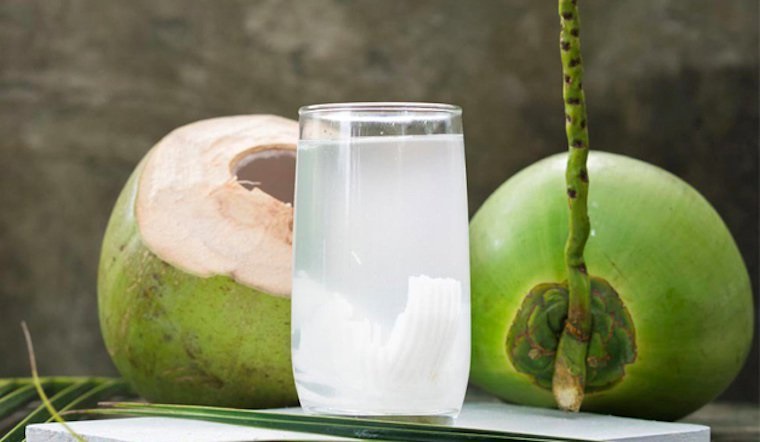1. Coconut Water – A Nutritious Drink to be Consumed in the Right Way
Coconut water has long been considered a natural “super drink” due to its high content of electrolytes, vitamins, and minerals, offering various health benefits such as cooling the body, detoxification, aiding digestion, and boosting immunity. However, if consumed incorrectly or in inappropriate situations, this drink can become a health hazard, even as toxic as arsenic.

Drinking Coconut Water This Way is Like Consuming Poison, as Harmful as Arsenic
2. Ways of Drinking Coconut Water that May Cause Harm
2.1. Drinking Coconut Water on an Empty Stomach
- Why it’s dangerous: Coconut water has a cooling nature, and drinking it when your stomach is empty can cause a sudden drop in body temperature, leading to stomach discomfort, bloating, abdominal pain, and electrolyte imbalance.
- Risk: Especially for people with low blood pressure, drinking coconut water on an empty stomach can aggravate dizziness and fatigue.
2.2. Drinking Coconut Water that Has Been Left Overnight
- Why it’s dangerous: Coconut water, when exposed to air and left overnight, is prone to fermentation and bacterial contamination. Microorganisms can proliferate, producing toxic substances such as methanol or ethanol.
- Risk: Consuming stale coconut water can lead to food poisoning, stomach pain, diarrhea, or even liver and kidney damage.
2.3. Drinking Chilled Coconut Water
- Why it’s dangerous: Chilled coconut water, especially straight from the refrigerator, can cause blood vessel constriction, headaches, or sore throat in individuals with a weak immune system.
- Risk: For people with cardiovascular or blood pressure issues, suddenly drinking cold coconut water can disrupt heart rhythm, posing a danger.
2.4. Consuming Excessive Amounts of Coconut Water in a Day
- Why it’s dangerous: Coconut water is high in potassium, and excessive consumption can lead to hyperkalemia, resulting in irregular heart rhythm, muscle weakness, or even cardiac arrest in severe cases.
- Risk: Adults should limit their intake to approximately 1-2 coconuts per day for safety.
2.5. Drinking Coconut Water During Intense Exercise
- Why it’s dangerous: While coconut water can replenish electrolytes, intense workouts cause a greater loss of sodium than potassium. Drinking coconut water does not provide enough sodium to compensate for the loss, leading to an electrolyte imbalance.
- Risk: This can result in muscle cramps, fatigue, or exhaustion post-workout.
3. Individuals Who Should Avoid Drinking Coconut Water
- People with Low Blood Pressure: Coconut water naturally lowers blood pressure and is not suitable for individuals with low blood pressure as it can cause dizziness and fatigue.
- Those Prone to Stomach Upset and Diarrhea: Due to its cooling nature, coconut water can exacerbate diarrhea and stomach discomfort.
- Pregnant Women in Their First Trimester: During early pregnancy, maintaining a stable body temperature is crucial. Drinking coconut water may negatively impact the health of both mother and fetus.

Coconut Water is Highly Beneficial, but Drinking it Incorrectly Can Cause More Harm Than Good
4. How to Drink Coconut Water Safely and Nutritiously
4.1. Consume it at the Right Time
- The best time to drink coconut water is in the morning or at noon when your body needs an energy and electrolyte boost.
- Avoid drinking coconut water in the evening, as it may cause stomach discomfort or bloating.
4.2. Choose Fresh Coconut Water
- Consume coconut water immediately after opening a fresh coconut, and avoid storing it or refrigerating it for more than 24 hours.
4.3. Drink in Moderation
- Adults should limit their intake to 250-500ml per day. For children, adjust the amount accordingly based on their age.
4.4. Combine it with Other Ingredients
- To enhance the flavor and benefits, consider adding a few slices of lemon, ginger, or mint leaves to your coconut water.
5. Conclusion
Coconut water is a naturally nutritious drink, but it must be consumed correctly to avoid unwanted side effects. Don’t let wrong habits turn this beneficial drink into a “poison.” Drink coconut water wisely to protect your and your family’s health.



































